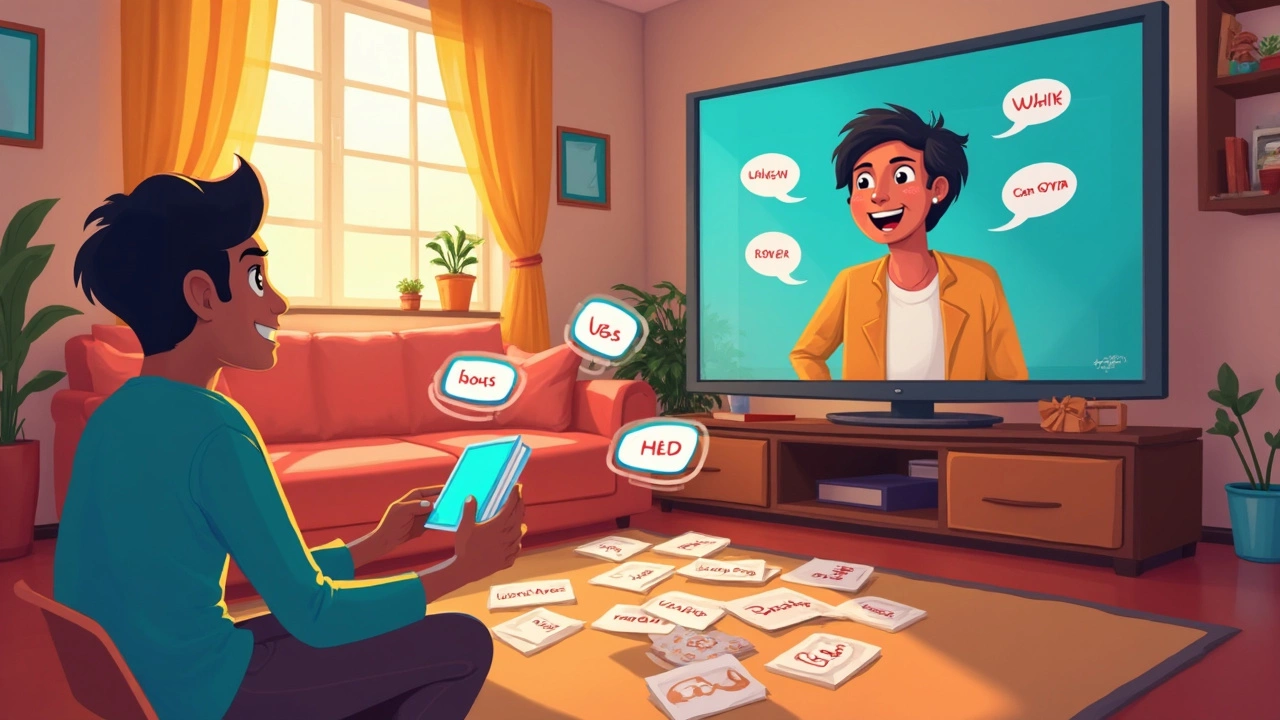Want to chat in English like a pro without spending a dime? Sure, you might not have a tutor sitting across from you, but guess what? The internet is packed with tools to help you out. Start by diving into YouTube, where tons of English teachers share free lessons. Whether it’s pronunciation drills or understanding slang, you’ll find it there. Plus, many videos come with captions, so you can read along and catch subtle nuances.
Language exchange apps are another goldmine. Apps like Tandem or HelloTalk let you team up with native speakers who want to learn your language. Think of it as a friendly exchange where you help each other improve. You get to practice speaking with real humans, which is priceless when you're trying to nail those tricky English sounds.
- Free Online Resources
- Practice with Language Partners
- Immersive Home Environment
- Speaking Challenges and Exercises
- Consistency and Routine
Free Online Resources
Did you know you can almost turn your laptop into a personal tutor? The internet’s got all sorts of sweet spots for learning English speaking. First off, there’s a little thing called YouTube. Platforms like EngVid and Rachel’s English have entire playlists dedicated to helping you ace that phone interview in English or have a smooth chat with a foreign friend.
Wanna dive a bit deeper? Websites like BBC Learning English and Voice of America offer loads of podcasts and articles tailored for learners like you. These resources break down news and everyday conversation into easy-to-digest segments, making it a breeze to follow along and mimic the pros.
Don’t overlook online platforms like Duolingo or Memrise, which turn learning into a game. Track your daily progress, earn points, and unlock new levels as you learn. They might focus more on vocabulary, but trust me, knowing words helps your speaking flow, too!
Here’s something solid: 80% of language learners use mobile apps regularly, according to a recent study. That’s quite a number, and it shows how popular these resources have become—no surprise there!
| Resource | Type | Focus |
|---|---|---|
| YouTube channels (EngVid, Rachel's English) | Video Lessons | Pronunciation, Conversation |
| BBC Learning English, Voice of America | Podcasts and Articles | Listening and Reading |
| Duolingo, Memrise | Mobile Apps | Vocabulary, Grammar |
By mixing these resources with some regular practice, you'll notice improvements in your English fluency without the need for spending a single cent. So, go ahead, make your 'get better at English' list and tackle it with these free tools!
Practice with Language Partners
Alright, so you've got all these great online resources, but talking to real people is where the magic happens. Finding a language partner might sound daunting, but trust me, there are loads of folks out there just like you, eager to practice their English or even help you out.
Start with language exchange platforms like Tandem or HelloTalk. These apps connect you with native English speakers who want to learn a language you speak. It's a two-way street; you help each other out. Spend half the time chatting in your language, and the other half in English. It’s a win-win!
- Be Bold: Don't be shy about making mistakes. Everyone's learning, and mistakes are just stepping stones to getting better.
- Set Regular Meetings: Make a schedule with your language partner. Consistency is key! Even if it's just 15 minutes a day, keep at it.
- Mix it Up: Talk about different topics each time. From food to travel to technology, varying subjects helps you learn new vocabulary.
If you're nervous about video chats, start with text or voice messages. Once you're comfy, move on to video calls. Remember, practice makes perfect!
Here's a quick look at two popular apps:
| App | Features |
|---|---|
| HelloTalk | Text, voice, and video chat |
| Tandem | Video calls and topic suggestions |
Diving into conversations with real people is like unlocking a secret level in a game. It's fun, it's rewarding, and your ability to learn English speaking just skyrockets. So go ahead, connect with people, and chat your way to fluency!

Immersive Home Environment
Want to boost your English fluency without setting foot in a classroom? Creating an English-speaking vibe right at home is a cool trick. First off, switch the language on your gadgets to English. Your phone, computer, even smart speakers—it pushes you into using English more often. Trust me, these tiny changes add up!
Reading English stuff is another winner. Start with something simple, like kid's books, and rev it up as you get comfy. Mix it up with English blogs or news sites. The goal is exposure. The more you read, the more it sticks.
Don't just stop at reading. Listen to English radio stations or podcasts on your morning jog or while you're cooking. You’re surrounded by language from real conversations, so even without realizing it, you’re getting how it all flows.
Put your speaking skills to the test. Talk to yourself, narrating what you're doing in English. It might sound silly, but it helps with pronunciation and confidence. You can even think about creating a journal in English or using voice memos to practice speaking. Every little bit counts when you’re trying to learn speaking English free.
Spice things up with English movies or TV shows. Watch with English subtitles first if you need to. Pay attention to expressions and phrases. I mean, who wouldn’t enjoy learning while binge-watching their favorite series?
Here’s a fun one: label stuff around your house with sticky notes. Everything from the refrigerator to your bedside lamp can wear a label, reminding you of its name in English whenever you see it. These constant gentle nudges keep your memory fresh without the pressure.
Speaking Challenges and Exercises
Alright, you're eager to learn English speaking fluently, and it's time to make it a bit of a game. Challenges and exercises are your best friends here. They're not just fun; they push you to think in English and respond quickly.
Start with tongue twisters. They're not just for laughs; these tricky phrases can help you improve your pronunciation and speed. Try saying, "She sells sea shells by the sea shore" as fast as you can. You'll stumble at first, but with practice, you'll sound smoother.
If you're looking for a bit more structure, set up a speaking journal. Each day, choose a topic and record yourself talking about it for three minutes. Doesn't matter if it's about your day, your plans, or a random topic like "Why pineapple on pizza is amazing." Listen to yourself afterward and notice what could be clearer or said differently.
- Use flashcards: Create flashcards with common phrases and sentences. Pick a few each day and work them into your conversation. Also a great way to expand your vocabulary on the go!
- 30-day speaking challenge: Commit to saying ten complete sentences in English every day for a month. It sounds simple, but consistency is key here.
- Mirroring technique: Watch a short English video and mimic the speaker. Try to match their speed and intonation. It’s super effective for improving accent and rhythm.
For those who love a bit of data, here's something interesting: According to a study conducted by Linguistic Lab in 2024, practice exercises like these improve speaking fluency by up to 65% when done regularly over three months.
Remember, it’s all about sticking with it and having a little fun along the way. Keep challenging yourself, and soon enough, speaking English will feel as natural as anything else.

Consistency and Routine
If you're serious about speaking English fluently, consistency and setting a routine are key. Think of language learning like training for a marathon. You wouldn't just run when you feel like it, right? Same goes for improving your English fluency. Make learning part of your daily life.
First, designate a specific time each day, even if it's just 20 minutes, for practicing your English skills. Whether it's during breakfast or right before bed, find a time slot that works for you and stick to it. Over time, this little habit will make a huge difference.
Set some tangible, small goals each week. For instance, you might decide to learn five new words a day and use them in a sentence. Or maybe practice speaking with a partner for 30 minutes thrice a week. Achieving these goals gives you a great sense of progress and keeps you motivated.
Having visual reminders can help too. Use post-it notes around your house with new vocabulary or grammar points. This way, English stays on your mind even when you're doing other things.
Consistency is more important than cramming a lot into one day. It’s like watering a plant regularly—it takes time to grow, but with regular care, you'll see some pretty cool progress. And remember, it's supposed to be fun, so mix things up to keep it interesting. Listen to a podcast today, chat with a friend tomorrow, or watch a movie this weekend. The more ways you engage with English, the more it sticks!
